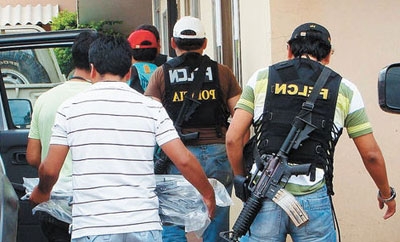Bolivia anti-narcotics police have dismantled an alleged international drug trafficking ring they say was headed by the Brazilian prison gang, the First Capital Command (PCC), an indication of the gang’s expanding reach west.
Special Anti-Narcotics Police (FELCN) arrested a group of 15 suspected drug traffickers in Santa Cruz on March 15, among them three Bolivians, two Colombians, two Paraguayans and eight Brazilians. La Razon reported that three PCC members were among those arrested, and were the leaders of the organization, according to FELCN Commander Colonel Gonzalo Quezada.
Quezada referred to the PCC members as “high level emissaries” and said they had been present in the country for close to two years. The PCC members established connections with domestic and international drug traffickers operating in the city of San German, close to the border with both Paraguay and Brazil, reported El Dia. The Bolivian suspects were allegedly responsible for collecting base from San German and Nuevo Horizonte, as well as importing it from Peru; the Colombians’ role was to process the base into cocaine, and the Paraguayans brought the finished illegal drugs to Brazil via Paraguay, El Dia said.
The police commander said the latest arrests were worrisome because they indicated a “more structured [PCC] organization.” Quezada said the FELCN planned to coordinate further efforts with Brazilian police in order to “disband all of these organizations and emissaries that come from Brazil.”
Police also seized high caliber arms, 700 kilos of illegal drugs, US $10,000 and nine vehicles during the operation, the Associated Press reported.
InSight Crime Analysis
The PCC, which originated in São Paulo, has expanded both inside and outside of Brazil, with members operating in 21 of 27 Brazilian states and various neighboring countries. Brazilian police sources said in 2011 the gang was using Paraguay as a base of operations.
Now, it is clear the PCC has set up camp in Bolivia as well. Three alleged members of the PCC were arrested in Santa Cruz in late January this year, and Quezada said in November that the PCC gets much of its cocaine from Bolivia via Peruvian plantations.
Bolivia’s government has previously denied the established, militarized presence of any drug cartel inside its borders, including the PCC, saying that only “emissaries” of these cartels are operative. However, following the most recent arrests, Quezada’s use of the word “disband” indicates that the police, at least, are admitting a more structural presence of drug trafficking organizations from Brazil.
The Santa Cruz department has become an important hub for drug trafficking in recent years, in part because of its geographic location offering a corridor for Bolivian and Peruvian cocaine to travel to Paraguay for transhipment to Brazil where it continues to mostly Europe or stays for sale on the burgeoning domestic market.
Police estimated in 2011 that as many as 3,000 Colombian drug traffickers were operating in the region. And following the dismantling of numerous cocaine laboratories and various cocaine seizures in the city of San German in 2012, Bolivian authorities announced they would install a permanent anti-narcotics base in the department.

